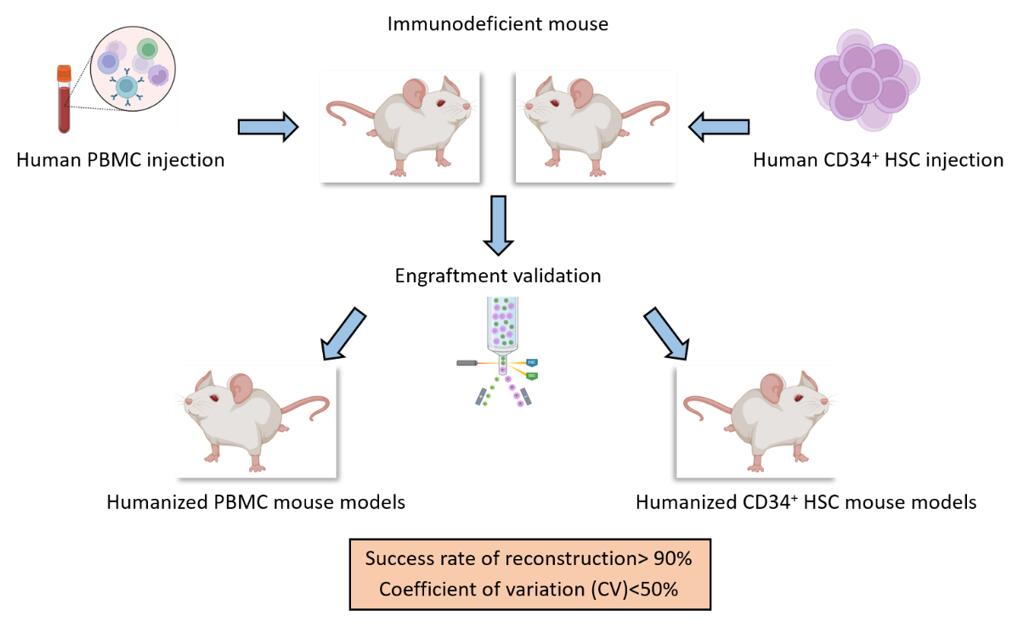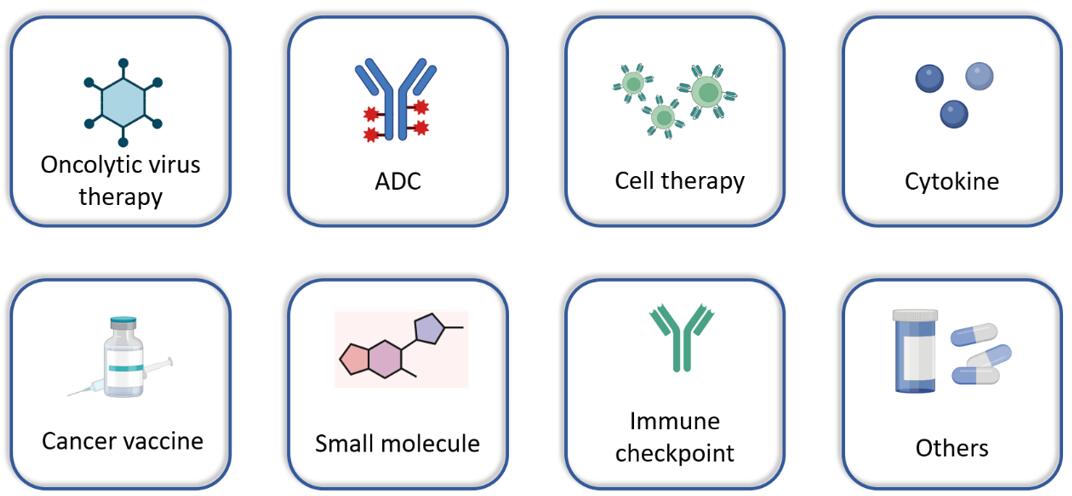- You are here: Home
- Disease Models
- Oncology Models
- Humanized Mouse Models
Disease Models
- Oncology Models
-
Inflammation & Autoimmune Disease Models
- Rheumatoid Arthritis Models
- Glomerulonephritis Models
- Multiple Sclerosis (MS) Models
- Ocular Inflammation Models
- Sjögren's Syndrome Model
- LPS-induced Acute Lung Injury Model
- Peritonitis Models
- Passive Cutaneous Anaphylaxis Model
- Delayed-Type Hypersensitivity (DTH) Models
- Inflammatory Bowel Disease Models
- Systemic Lupus Erythematosus Animal Models
- Asthma Model
- Sepsis Model
- Psoriasis Model
- Atopic Dermatitis (AD) Model
- Scleroderma Model
- Gouty Arthritis Model
- Carrageenan-Induced Air Pouch Synovitis Model
- Carrageenan-Induced Paw Edema Model
- Experimental Autoimmune Myasthenia Gravis (EAMG) Model
-
Cardiovascular Disease Models
- Surgical Models
- Animal Models of Hypertension
- Venous Thrombosis Model
- Atherosclerosis model
- Cardiac Arrhythmia Model
- Hyperlipoidemia Model
- Doxorubicin-induced Heart Failure Model
- Isoproterenol-induced Heart Failure Model
- Arterial Thrombosis Model
- Pulmonary Arterial Hypertension (PAH) Models
- Heart Failure with Preserved Ejection Fraction (HFpEF) Model
-
Neurological Disease Models
- Alzheimer's Disease Modeling and Assays
- Seizure Models
- Parkinson's Disease Models
- Ischemic Stroke Models
- Acute Spinal Cord Injury (ASCI) Model
- Traumatic Brain Injury (TBI) Model
- Hypoxic-Ischemic Encephalopathy (HIE) Model
- Tourette Syndrome (TS) Model
- Amyotrophic Lateral Sclerosis (ALS) Model
- Huntington's Disease (HD) Model
- Intracerebral hemorrhage (ICH) Models
- Pain Models
- Metabolic Disease Models
- Liver Disease Models
- Rare Disease Models
- Respiratory Disease Models
- Digestive Disease Models
-
Urology Disease Models
- Cisplatin-induced Nephrotoxicity Model
- Unilateral Ureteral Obstruction Model
- 5/6 Nephrectomy Model
- Renal Ischemia-Reperfusion Injury (RIRI) Model
- Diabetic Nephropathy (DN) Models
- Passive Heymann Nephritis (PHN) Model
- Adenine-Induced Chronic Kidney Disease (CKD) Model
- Kidney Stone Model
- Doxorubicin-Induced Nephropathy Model
- Orthopedic Disease Models
- Ocular Disease Models
- Skin Disease Models
- Infectious Disease Models
Humanized Mouse Models
Creative Bioarray boasts extensive expertise in mouse humanization, a pivotal technique for researching cancer vaccines, and various immuno-modulatory therapies that necessitate the intricate dynamics of a human immune system. Our team of seasoned scientists at Creative Bioarray partners with you to craft the most strategic study designs, ensuring that your research questions are addressed as efficiently and cost-effectively as possible.
Humanized mice are a sophisticated class of rodents meticulously engineered to harbor human genes, cells, tissues, or organs. These unique animals are designed to closely replicate human physiological processes, making them indispensable for studying human diseases, particularly cancer. By integrating human immune cells into these in vivo models, humanized mice possess an immune system that closely resembles that of humans. This feature allows for exploring the intricate dynamics between cancer cells and the immune system, offering profound insights into cancer immunology. Such understanding is crucial for advancing novel immunotherapies that aim to leverage specific elements of the immune system to combat cancer. This approach not only enhances our knowledge of cancer biology but also opens new avenues for developing targeted treatments that could revolutionize cancer therapy.
Available Humanized Mouse Models in Creative Bioarray
Creative Bioarray has successfully developed stable humanized mouse models within immunodeficient mice, meticulously reconstructing the human immune system. These models are specifically designed to assist our clients in evaluating their compounds. These innovative models not only facilitate a deeper understanding of the immune system's interaction with various therapeutic agents but also accelerate the development of effective cancer treatments, making them an invaluable asset in the fight against cancer.
Each of our humanized mouse models is exclusively available for application in tumor studies, helping you take the next step in evaluating your compounds in immuno-oncology (IO). The available humanized mouse models are:
- hPBMC-T Cell Reconstitution Model
- hPBMC-B Cell Reconstitution Model
- hPBMC-NK Cell Reconstitution Model
- hPBMC-Long Term Model
- hPBMC Donor Screening & QC Platform
Humanized CD34+ HSC Mouse Models
 Fig. 1 Humanized mouse models in Creative Bioarray.
Fig. 1 Humanized mouse models in Creative Bioarray.
Graft vs Host Disease (GvHD) Model
Application
Humanized mouse models are the preferred preclinical platform for testing IO drug candidates in vivo. These models allow drug candidates to utilize human immune cells to fight tumors. This innovative platform enables clients to evaluate the efficacy, pharmacodynamics, and mechanisms of action of various cancer therapeutics that modulate human immunity, such as:
 Fig. 2 Application of humanized mouse models in Creative Bioarray.
Fig. 2 Application of humanized mouse models in Creative Bioarray.
Quotation and Ordering
Creative Bioarray is dedicated to propelling cancer research forward through the development of cutting-edge Humanized Mouse Models. Our commitment to innovation ensures that researchers have access to the most sophisticated and impactful tools available in the field of cancer immunology. By partnering with Creative Bioarray, you are not only tapping into a wealth of expertise and advanced technology but also contributing to groundbreaking advancements in understanding and combating cancer. If you are interested in our services, please feel free to contact us at any time or submit an inquiry to us directly.
For research use only. Not for any other purpose.

